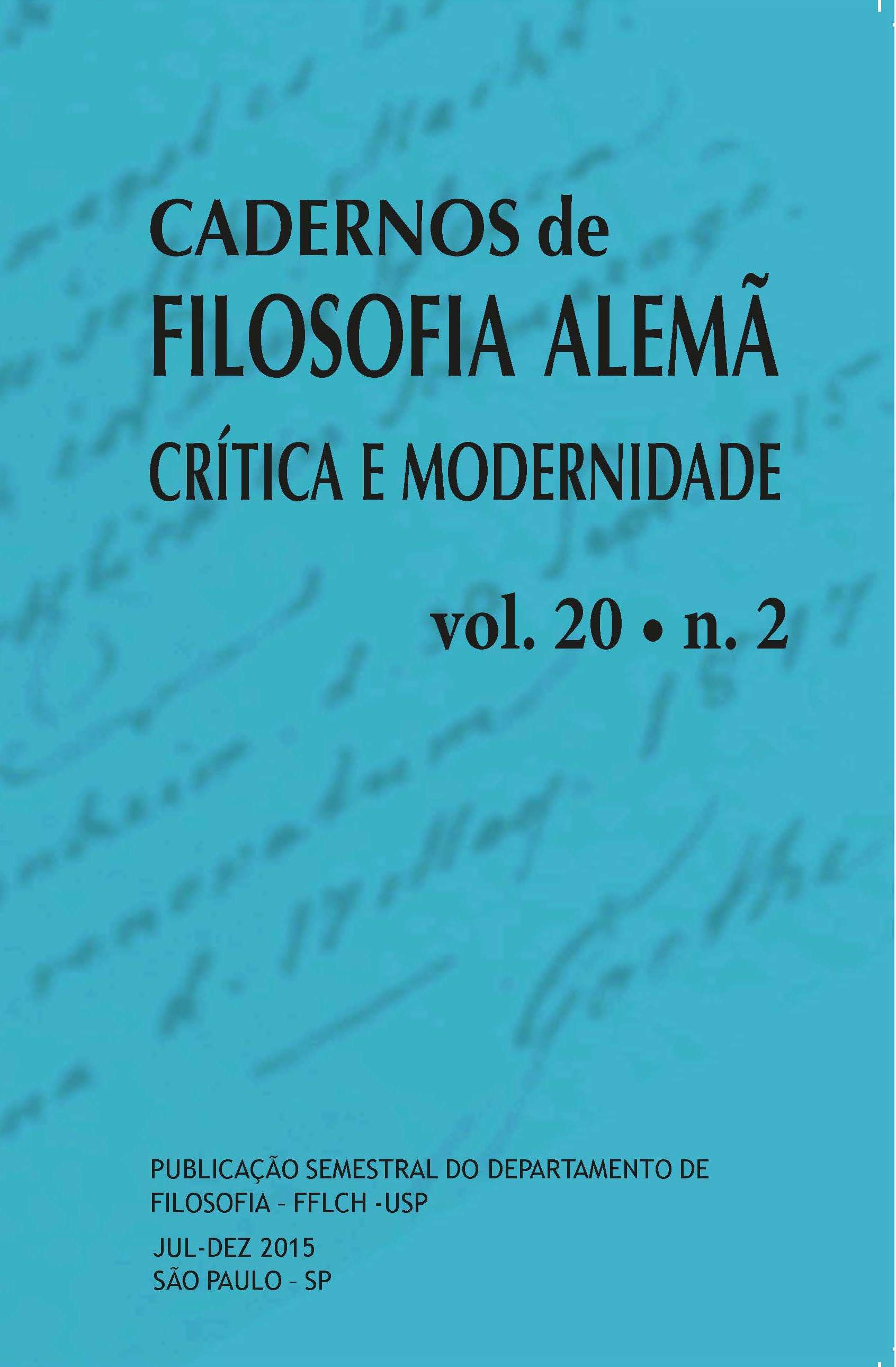Transcendentes ou transcendentais? Um ensaio sobre Kant e o erro dos escolásticos
DOI:
https://doi.org/10.11606/issn.2318-9800.v20i2p179-200Palabras clave:
transcendente, transcendental, metafísica, Immanuel Kant, João Duns Escoto.Resumen
O termo “transcendental” tem sido de fundamental importância para a discussão produzida nos mais variados campos da filosofia contemporânea. Isso se deve, em larga medida, ao fato de a filosofia de Kant ser a inegável e constante referência para autores dos séculos XIX a XXI. Daí se derivou uma problemática projeção da noção de “transcendental” sobre a filosofia de autores escolásticos medievais. Embora estes últimos se valessem do termo “transcendente”, eles nem mesmo conheciam o termo “transcendental”. A confusão entre ambos os termos não poderia ser mais prejudicial para a leitura de autores medievais.Descargas
Referencias
AERTSEN, J. A. Medieval Philosophy and Transcendentals. The Case of Thomas Aquinas. Leiden - New York – Köln: Brill, 1996.
_________. Medieval Philosophy as Transcendental Thought. From Philip the Chancellor (ca. 1225) to Francisco Suárez. Leiden: Brill, 2012.
CHARRON, P. de. De la Sagesse. In: ________. Toute les oeuvres de Pierre Charron parisien, docteur es droicts, chantre et chanoine Theologal de Condom. Dernière edition. Reveues, corrigees et augmentées. Paris: Chez Jaques Villery, 1635.
CROSS, R. ‘Where Angels Fear to Tread’: Duns Scotus and Radical Orthodoxy. Antonianum, 76, 2001, pp.7-41.
DE MURALT, A. “Kant, le dernier occamien: une nouvelle définition de la philosophie moderne”. In: _________. La métaphysique du phénomène. Les origines médiévales et l’élaboration de la pensée phénoménologique. Paris: Vrin, 1985, pp.138-159.
DOYLE, J. P. Between Transcendental and Transcendental: the Missing Link?. The Review of Metaphysics, 50.4, 1997, pp.783-815.
GILSON, É. Avicenne et le point de départ de Duns Scot. Archives d’histoire doctrinale et littéraire du Moyen Âge, 1927, pp.89-149.
_________. Jean Duns Scot. Introductio à ses positions fondamentales. Paris: Vrin, 1952, pp.97-8.
_________. The Unity of Philosophical Experience. San Francisco: Ignatius Press, 1999 (1937).
HABERMAS, J. “Wahrheitstheorien”. In: _________. Vorstudien und Ergänzungen zur Theorie des kommunikativen Handelns. Frankfurt am Main: Surkhamp Verlag, 1984, pp.187-225.
HONNEFELDER, L. Scientia transcendens. Die formale Bestimmung von Seiendheit und Realität in der Metaphysik des Mittelalters und der Neuzeit. Hamburg: Felix Meiner, 1990.
_________. Johannes Duns Scotus. München: Beck, 2005.
IOANNES DUNS SCOTUS. Opera omnia. Cura et Studio Commissionis scotisticae. Vaticano: Typis Polyglottis Vaticanis, 1950-.
_________. Opera philosophica. Ed. St. Bonaventure University. St. Bonaventure: The Franciscan Institute, 1997-2006.
KANT, I. Kritik der reinen Vernunft. Herausgegeben von Wilhelm Weischedel. 2 Bd. Frankfurt am Mein: Suhrkamp Verlag, 1974.
_________. Crítica da razão pura. Tradução de Manuela Pinto dos Santos e Alexandre Fradique Morujão. Introdução e notas de Alexandre Fradique Morujão. Lisboa: Fundação Calouste Gulbekian, 2001.
KANTII, I. Opera ad philosophiam criticam. Vol. 1 – cui inest Critica rationis purae. Latine vertit Fredericus Gottlob Born. Lipsiae: Impensis Engelhard Beniamin Schwickerti, 1796.
KNITTERMEYER, H. Der Terminus transszendental in seiner historischen Entwicklung bis zu Kant. Inaugural-Dissertation zur Erlangung der Doktorwürde der Hohen Philosophischen Fakultät der Universität Marburg. Marburg: Buchdruckerei von Joh. Hamel, 1920.
LEISEGANG, H. Über die Behandlung des Scholastischen Satzes: „Quodlibet ens est unum, verum, bonum seu perfectum“, und seine Bedeutung in Kants Kritik der reinen Vernunft. Kantstudien, 20.2-3, 1915, pp.403-21.
LIBERA, A. de. L’art des généralités. Théories de l’abstraction. Paris: Aubier, 1999.
POPKIN, R. The History of Scepticism. From Savonarola to Bayle. Oxford: Oxford University Press, 2003.
RIJK, L. M. de. “The Aristotelian Background of Medieval transcendentia: a Semantic Approach”. In: PICKAVÉ, M. (Hrsg.). Die Logik des Transzendentalen. Festschrift für Jan A. Aertsen zum 65. Geburtstag. Berlin, New York: De Gruyter, 2003, pp.3-22.
SONDAG, G. “Universel et natura communis dans l’Ordinatio et dans les Questions sur le Perihermeneias (une brève comparaison)”. In: HONNEFELDER, L., WOOD, R., DREYER, M. (eds.). John Duns Scotus: Metaphysics and Ethics. Leiden - New York – Köln: Brill, 1996, pp.385-391.
WOLTER, A. The Transcendentals and their Function in the Metaphysics of Duns Scotus. St. Bonaventure: The Franciscan Institute, 1946.
Descargas
Publicado
Número
Sección
Licencia
As informações e conceitos emitidos em textos são de absoluta responsabilidade de seus autores.
Todos os artigos anteriores a 5 de julho de 2018 e posteriores a julho de 2021 estão licenciados sob uma licença CC BY-NC-ND, exceto os publicados entre as datas mencionadas, que estão sob a licença CC BY-NC-SA. A permissão para tradução por terceiros do material publicado sob a licença CC BY-NC-ND poderá ser obtida com o consentimento do autor ou autora.
Políticas de acesso aberto - Diadorim


